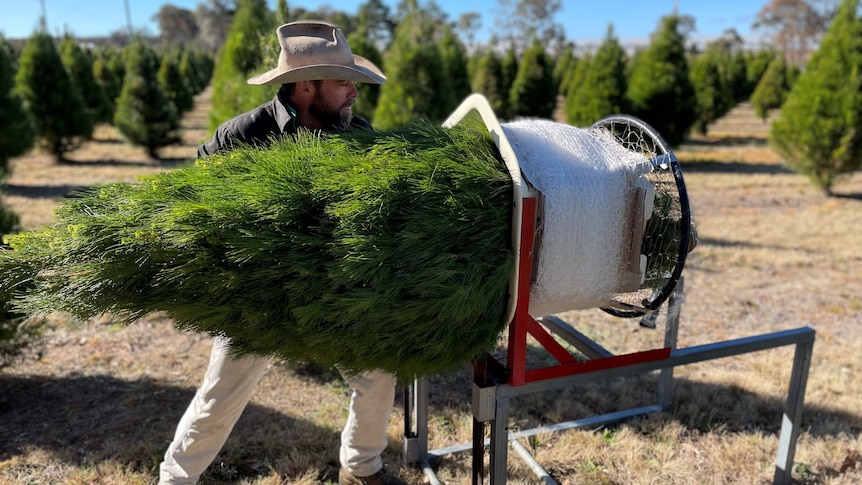A young couple who met on an outback cattle station have turned their desire to make their own life on the land into an unexpected business—farming Christmas trees.
Key points:
- Brad and Katrina Fraser tired of life in the outback so set up a huge Christmas tree farm
- The couple are growing 15,000 trees, raising two children and running a shop
- Their farm employs seasonal 25 staff and attracts visitors from all over Queensland and New South Wales
Brad and Katrina Fraser hand-planted their first crop of 2,000 Christmas trees on Queensland’s Granite Belt seven years ago.
Today, they’re growing 15,000.
“It all really came about when I was pregnant with my our first child Evelyn and I wanted to be a stay-at-home mom,” Katrina says.
“Brad was just like, ‘Well if you’re going to be a stay-at-home mom, we’re going to need to get creative with what we’re going to do on 20 acres.’
“We just thought really hard about what was missing from the region, and came up with Christmas, and that’s how it was born really.”
Farming Christmas trees in the coldest part of the Sunshine State was a big leap for Brad and Katrina, who met while working on a remote station in western Queensland.
“I was just a ringer out there at Boulia, and Katrina was our station cook. I thought, ‘Oh gee, she cooks good meals — I could end up in a good paddock here,” Brad says.
They both loved outback life, but drought forced them to make a change.
“It was a really hard time, seven days a week on the property for Brad, and I would drive into Longreach,” Katrina recalls.
“So it was that decision that we’re like, ‘OK, we need to, for mental health reasons, get away and do something for us.'”
The pair admits that taking the plunge in 2015 was a huge gamble.
Katrina says they ordered the seedlings and decided to plant them in their back paddock.
“I think Brad hand-pushed the rotary hoe, so no machines.”
Once the trees were in the ground, it would still be four to five years before they’d be big enough to harvest.
With nothing to do but wait, Brad and Katrina set about turning what was once accommodation quarters on their former apple farm into a beautiful Christmas gift shop.
Their farm shop opened in 2017, six weeks after the arrival of their second child.
“In the beginning I had the little cot in the back room and I thought, I’m just going to play shops and be a mum,” Katrina says.
“And that lasted I think, two weeks.”
The reality of running the farm, a shop, a cafe and looking after a toddler and a newborn meant the pair quickly had to come up with “Plan B”.
“Mr Stockman had to turn into a retailer,” Brad says.
“I’ve never done retail or hospitality. And yeah, I was the face of the business for the first two years. People would walk in to the Granite Belt Christmas Farm and see me.”
Perfecting the Christmas tree shape also keeps Brad busy. Each tree requires careful pruning six to seven times a year.
“I just self-learned,” he says.
“You get your eye in with what is straight. So that’s what I reckon has really helped me to get the edges right — although I still stuff it up.”
As well as honing his pruning skills, caring for the trees in general has been a big learning curve for the former jackaroo.
“Oh yeah, cows are so much easier,” he says.
“I thought, ‘I’ll just check a tree in the ground and flick a bit of water on it and give it a little bit of a prune and away I go.’
“I can do something today and I won’t find out for weeks if it’s even done anything.”
The harvest starts the last weekend in November, and runs right through until December 23 — unless they sell out earlier.
During that Christmas rush, the Frasers employ 25 people across their farm, shop and cafe.
Visitors come from all over — mostly Queensland and New South Wales — looking to make a tradition out of getting a living Christmas tree.
Besides the Christmas harvest, July is their next busiest time of year.
As well as their usual farm experiences, they also host special Christmas in July lunches every Saturday.
“We’ve probably been working maybe 60 days straight now, if not more,” Katrina says.
“So it gets very tiring! But in saying that, in the Christmas world there’s so much to be thankful for, and such good customers.”
Not everyone is sure about living Christmas trees though.
Brad and Katrina say often the reluctance stems from a past experience where people have perhaps not treated their cut trees properly.
“Some people have put them in the wrong,” Brad says.
“They put them in sand and water [and] sand it just turns them off real quick. They need to be just in water.”
Becoming Christmas tree farmers was by no means a lifelong ambition for Brad, nor Katrina, but now that they’ve put down some serious roots in Stanthorpe they both agree they’re fully committed.
“We are growing and expanding too, and having another shop put on site in November,” Katrina says.
“We love seeing that joy, and that really adds to the community,” Brad adds.
“Coming from out west, you know, people mean a lot to you out there, so having this shop and having the feelings it gives to people — that’s paying too, and that’s pretty cool.”
.
